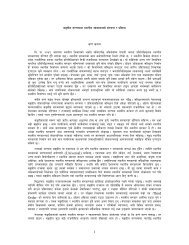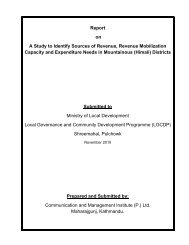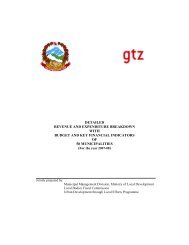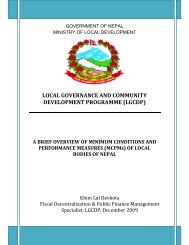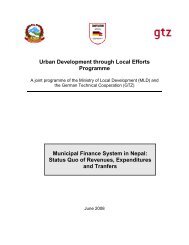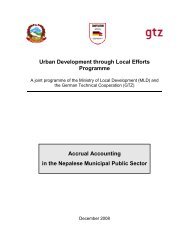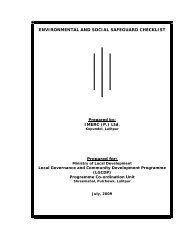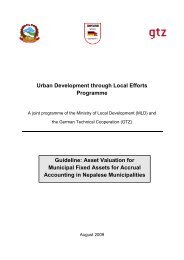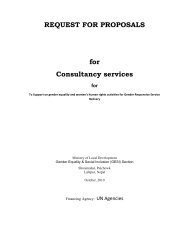GTZ Report on Proposal for Nepal Grant Formula - LGCDP
GTZ Report on Proposal for Nepal Grant Formula - LGCDP
GTZ Report on Proposal for Nepal Grant Formula - LGCDP
Create successful ePaper yourself
Turn your PDF publications into a flip-book with our unique Google optimized e-Paper software.
<strong>Proposal</strong> <strong>for</strong> a municipal grant allocati<strong>on</strong> <strong>for</strong>mula 2Prec<strong>on</strong>diti<strong>on</strong>s <strong>for</strong> and assumpti<strong>on</strong>s <strong>on</strong> a local government system in a federal <strong>Nepal</strong>c<strong>on</strong>diti<strong>on</strong>al and unc<strong>on</strong>diti<strong>on</strong>al grants.gtz/udle hopes to support the discussi<strong>on</strong> process <strong>on</strong> a new local government oinance system in a feder-al <strong>Nepal</strong> and welcomes comments <strong>on</strong> this paper.1.1 Principle of subsidiarity and c<strong>on</strong>gruenceIt may be regarded as success of decentralisati<strong>on</strong> ef<strong>for</strong>ts that publicati<strong>on</strong>s not <strong>on</strong>ly refer to local gov-ernment structure and functi<strong>on</strong>s as in the 1970s and 1980s (<strong>for</strong> example Stamp 1986), but also <strong>on</strong> loc-al government oinance since the 1990s, and that local governments are much more important in ser-vice delivery than they were until the 1990s (<strong>for</strong> example Tordorff and Young 1994, Wunsch 2000). Local governments in a federal state may have very different c<strong>on</strong>stituti<strong>on</strong>al, legal and oinancial rights, and often, their positi<strong>on</strong> in a federal state is threatened (Gboyega 1991).The oirst assumpti<strong>on</strong> of this paper is that within a future federal <strong>Nepal</strong>, there is local self-‐governance <strong>for</strong> local communities. Although the precise structure of local units has not been decided yet, the as-sumpti<strong>on</strong> is made that there is a unioied legislati<strong>on</strong> <strong>on</strong> local government that addresses both the cur-rent municipalities and rural communities. The assumpti<strong>on</strong> is that there will be no district councils in the future.Local self-‐governance is the corner st<strong>on</strong>e of a new local governance oinance system:“It is quite plausible to argue that in the matter of service deliveries as well as in local busi-ness development, c<strong>on</strong>trol rights in governance structures should be assigned to people who have the requisite in<strong>for</strong>mati<strong>on</strong> and incentives and at the same time will bear resp<strong>on</strong>s-ibility <strong>for</strong> the (political and ec<strong>on</strong>omic) c<strong>on</strong>sequences of their decisi<strong>on</strong>s. In many situati<strong>on</strong>s, this insight calls <strong>for</strong> more devoluti<strong>on</strong> of power to local authorities and communities” (Bardhan 2002, 202). The principle of subsidiarity encourages local self-‐governance <strong>for</strong> all local affairs.“Until the late 1980s, decentralisati<strong>on</strong> experiments in sub-‐Saharan Africa tended in the majority of states to rein<strong>for</strong>ce central c<strong>on</strong>trol rather than enhance local aut<strong>on</strong>omy” (Tor-dorff 1994, 555). Key less<strong>on</strong> from decentralisati<strong>on</strong> re<strong>for</strong>m in Comm<strong>on</strong>wealth Sub-‐Saharan Africa is “that if representative authorities are to have more than a symbolic development role, they must be strengthened in both stafoing and oinancial resources” (Tordorff 1994, 579). And this is deoinitely true <strong>for</strong> all decentralisati<strong>on</strong> ef<strong>for</strong>ts in any country, regardless whether industrial-ised, developing, or in transiti<strong>on</strong>.“After all, the logic behind decentralizati<strong>on</strong> is not just about weakening the central author-ity, nor is it about preferring local elites to central authority, but it is fundamentally about making governance at the local level more resp<strong>on</strong>sive to the felt needs of the large majority of the populati<strong>on</strong>” (Bardhan 2002, 202). The principle of subsidiarity indicates that <strong>on</strong>ly those services and public functi<strong>on</strong>s should be operated by higher levels of government if the regulati<strong>on</strong>, producti<strong>on</strong> and delivery of these services <strong>on</strong> the local level would result in either very low efoiciency of effectiveness. The principle of c<strong>on</strong>gruence demands Dr Alexander Wegener interpublic c<strong>on</strong>sultancywww.interpublic-‐berlin.de



